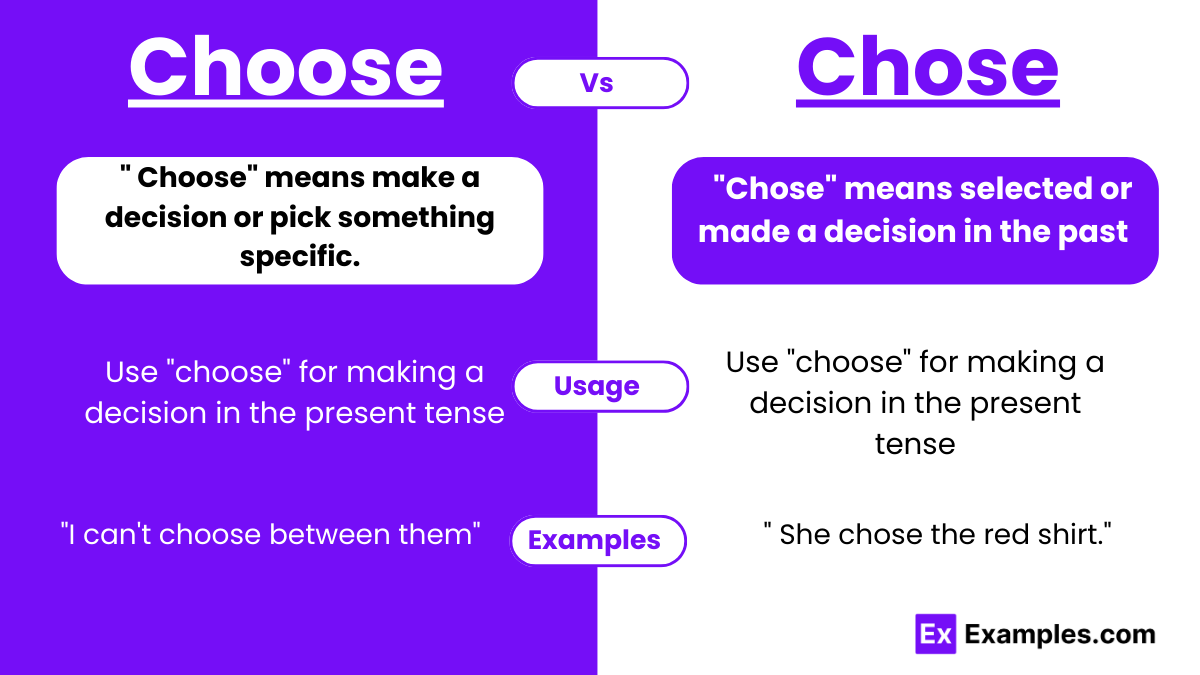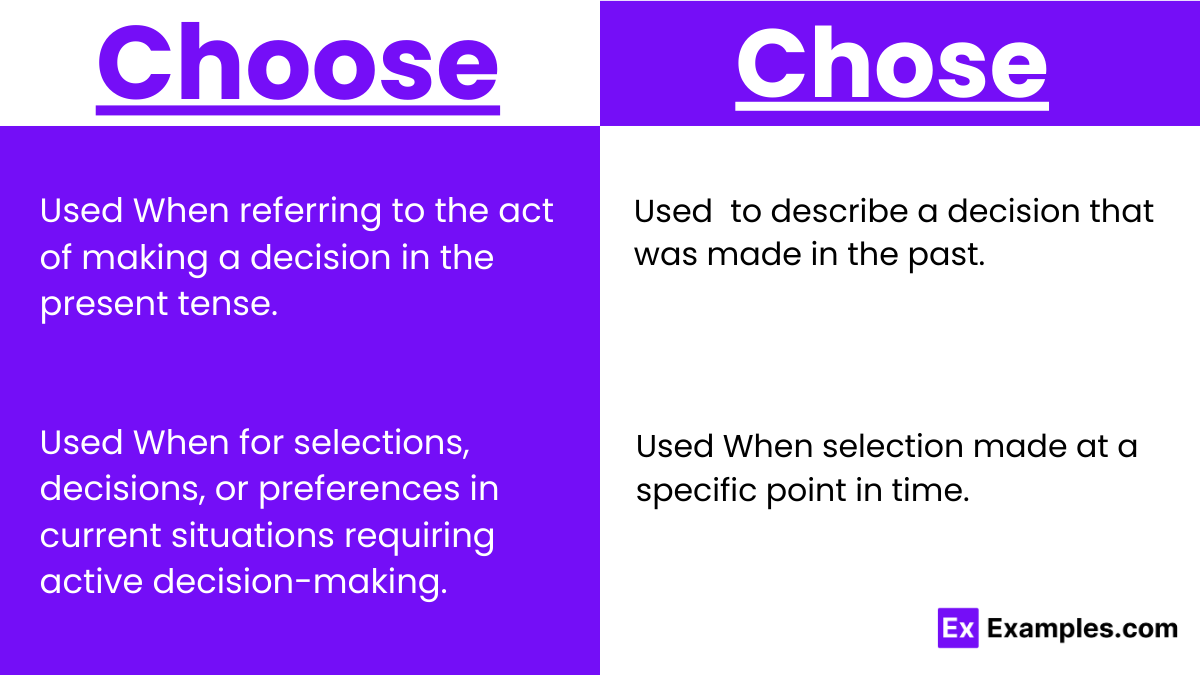Choose vs Chose – Meanings, Differences, Usage, Examples
Navigating between “Choose” and “Chose” is essential for effective communication. This comprehensive guide illuminates the distinction between these verbs, providing illuminating examples to clarify their usage. Whether crafting an email, composing an essay, or engaging in conversation, understanding when to “Choose” and when to “Chose” enhances your language proficiency. Explore this guide for practical insights, ensuring your words resonate with precision and impact in every communication endeavor.
Choose vs Chose – Meanings
“Choose“ is a verb that signifies the act of making a decision or selecting from a range of options. It indicates the present or future tense, as in “I will choose the blue dress for the party” or “She chooses to study abroad next semester.”
“Chose” is the past tense form of the verb “Choose.” It indicates that a decision or selection has already been made in the past. For example, “He chose the red car instead of the blue one” or “She chose to pursue a career in medicine.” Understanding the distinction between these two words is crucial for precise communication in both spoken and written contexts.
Summary
How To Pronounce Choose and Chose
Choose:
- Phonetic Pronunciation: /tʃuːz/
- Phonetic Breakdown: chu-ooz
Chose:
- Phonetic Pronunciation: /tʃoʊz/
- Phonetic Breakdown: chohz
Differences Between Choose and Chose
| Aspect | Choose | Chose |
|---|---|---|
| Tense | Present | Past |
| Definition | The act of making a selection | The past tense of “choose” |
| Example | “I choose chocolate ice cream.” | “Yesterday, she chose vanilla.” |
| Usage | Used when making a decision in present tense | Used to describe a decision made in the past |
| Pronunciation | Pronounced as /tʃuːz/. | Pronounced as /tʃoʊz/. |
How To Remember The Differences Between Choose and Chose
Present vs. Past:
- Associate “Choose” with the present tense, reminding yourself that it’s the action of making a decision right now.
- Connect “Chose” with the past tense, indicating a decision that has already been made.
Visual Cue:
- Imagine a present-day scenario where you’re choosing between options, linking it with “Choose.”
- Picture a past event where you already made a decision, connecting it with “Chose.”
Tricks to Remember the Differences Between “Choose” and “Chose”
Continuous Action vs. Completed Action:
- Think of “Choose” as an ongoing process, reminding yourself that you’re actively choosing from available options.
- Consider “Chose” as a completed action, signaling that the decision has already been made and is now in the past.
When to Use Choose and Chose
Usage of “Choose”
- When referring to the act of making a decision in the present tense.
- Example: “I choose the blue shirt over the red one.”
- Example: “Please choose your preferred method of payment.”
Usage of “Chose”
- Chose is used to describe a decision that was made in the past.
- Example: “Yesterday, she chose the salad instead of the sandwich.”
- Example: “He chose to pursue a career in music when he was young.”
Choose and Chose Examples
Examples of “Choose”
- I choose to go for a run every morning.
- Please choose your favorite movie from the list.
- He always chooses the healthier option for lunch.
- Students can choose their elective courses for next semester.
- Sarah couldn’t decide between pizza and pasta, so she had to choose one.
Examples of “Chose”
- Yesterday, she chose the blue dress for the party.
- He chose to spend his vacation exploring the mountains.
- We chose the hotel because of its proximity to the beach.
- Sarah chose to study abroad for a semester during college.
- The committee chose John as the winner of the competition.
Synonyms For Choose and Chose
| Verb (Choose) | Past Tense (Chose) |
|---|---|
| Select | Selected |
| Opt for | Opted for |
| Pick | Picked |
| Decide on | Decided on |
| Elect | Elected |
Exercise
Fill in the blanks with the appropriate form of “choose” or “chose”:
- Yesterday, she __________ to watch a comedy movie instead of a thriller.
- Students must __________ their elective courses for next semester by the end of the week.
- Sarah couldn’t decide, so she asked her friend to help her __________ a restaurant for dinner.
- Last week, they __________ to go hiking in the mountains for their weekend getaway.
- Before making a decision, take your time to carefully __________ the best option.
Answers:
- chose
- choose
- choose
- chose
- choose
FAQ’S
Why did we choose or chose?
“We chose” is used because it’s the past tense form of “choose,” indicating a decision made in the past. It’s correct to say “Why did we choose?”
What are the three forms of chose?
The three forms of “chose” are “choose” (present tense), “chose” (past tense), and “chosen” (past participle).
Should I use choose or chose?
You should use “choose” for present tense actions, like “I choose,” and “chose” for past tense actions, like “Yesterday, she chose.” Select the appropriate form based on the timeframe of the action.
What is the best form of verb choose?
The best form of the verb “choose” depends on the context: “choose” for present tense, “chose” for past tense, and “chosen” for past participle in perfect tenses.




